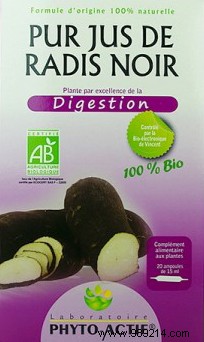
While the pink radish is found on our plates and is eaten plain, in salads or as an accompaniment, this is not the case with the black variety. This vegetable is mainly used in alternative medicine. What are the virtues of black radish?
If the black radish is still unknown to many people today, it is because, unlike other vegetables of its kind, this variety cannot be cooked. We do not have to recognize it when it is indicated in prescription since in this case, the black radish generally comes in the form of capsules, capsules, syrup or juice. However, also known as the big gray, this herbaceous plant of the brassica family will be recognized among a thousand by its black roots, rough and raspy to the touch, with an average length of 15 to 20 centimeters for the varieties long and with a diameter of 6 to 10 centimeters for the round varieties. Note that it is very easy to grow in the garden (see the black radish culture sheet).
These are also the only used parts of the black radish. However, if Raphanus sativus var. Niger is now very popular in alternative medicine, it is not because of its shape, but above all thanks to its components, to name only vitamin C2 and potassium. Moreover, this vegetable has already joined the list of therapeutic and medicinal leguminous plants listed by the French Pharmacopoeia.

Rich in glucosinolates, isothiocyanates and raphanin, the roots of gros gris are particularly effective against digestion and intestinal transit problems . Black radish is generally prescribed in case of transient constipation, abdominal bloating or indigestion. Moreover, since this vegetable would also promote the secretion of bile, black radish would be an excellent purifier and detoxifier of the liver while taking care of liver pain.
This is why this root is recommended after alcohol abuse, because its enzymes accelerate the elimination of toxins. But its benefits are not only limited to these organs, but also extend to the respiratory system and blood circulation. Finally, saturated with antioxidants, black radish would be an excellent anti-carcinogenic.
However, even if so far, no adverse effects have been noted regarding this vegetable, some precautions should however be observed. And regarding the dosage, in case of treatment or prevention, an adult person should not ingest more than one hundred milliliters of black radish juice if diluted in water, otherwise fifteen milliliters if pure.
An overdose can then be manifested by outbreaks of hives or heartburn. On the other hand, if the person suffers from gastric diseases such as ulcers for example, or from obstruction of the bile duct by a lithiasis, black radish is to be avoided. In any case, ask your doctor if you are taking medication to avoid bad associations and interactions.